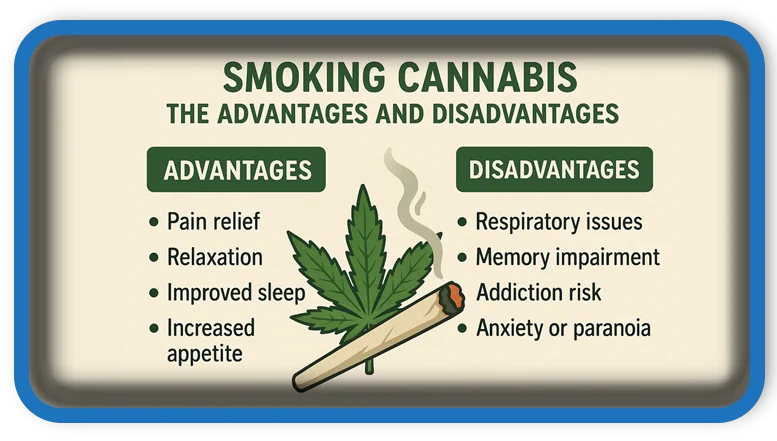⏲️ Estimated reading time: 4 min
Pros and Cons of Smoking Cannabis. Smoking cannabis has both therapeutic benefits and notable risks. This in-depth article explores the advantages and disadvantages of cannabis use in everyday life and medical treatments, based on science and real-world evidence.
The Pros and Cons of Smoking Cannabis: What You Need to Know
Smoking cannabis is a highly debated topic. On one hand, scientific evidence supports its effectiveness in treating certain medical conditions. On the other, recreational use and excessive consumption can lead to serious physical and mental health issues.
In this article, we’ll break down both the advantages and disadvantages of smoking cannabis, helping you make an informed decision about its use.
✅ Pros of Smoking Cannabis
1. Chronic Pain Relief
One of the most well-documented medical uses of cannabis is for managing chronic pain, especially in patients suffering from:
- Rheumatoid arthritis
- Multiple sclerosis
- Neuropathic pain
- Cancer-related pain
The cannabinoids in marijuana, particularly THC and CBD, interact with the body’s endocannabinoid system, reducing pain signals without the severe side effects of opioids.
2. Reduced Anxiety and Stress
Smoking cannabis can induce a feeling of calm, relaxation, and euphoria. For some people, this effect is helpful in managing everyday stress and anxiety.
Low doses of THC may have anxiolytic effects (anxiety-reducing). Also, cannabis strains high in CBD can have antipsychotic and calming effects without producing a high.
3. Improved Appetite and Nausea Relief
Cannabis is well known for stimulating appetite, especially useful for patients dealing with:
- Chemotherapy-related nausea
- HIV/AIDS-related weight loss
- Eating disorders
Cannabis can ease nausea and vomiting, helping patients regain strength and maintain nutrition.
4. Better Sleep Quality
People suffering from insomnia or sleep disturbances often turn to cannabis for its sedative properties. It can:
- Help with faster sleep onset
- Prolong deep sleep phases
- Reduce nighttime awakenings
For some, cannabis offers a natural alternative to sleeping pills.
5. Neurological Symptom Control
Cannabis use has shown benefits for neurological conditions such as:
- Epilepsy (especially drug-resistant types)
- Parkinson’s disease (reduces tremors and rigidity)
- Multiple sclerosis (alleviates muscle spasms)
Some CBD-based products have even been approved for treating specific forms of childhood epilepsy.
6. Anti-Inflammatory Properties
CBD is a strong anti-inflammatory compound. It’s helpful in treating:
- Autoimmune diseases like Lupus or Crohn’s
- Chronic inflammatory conditions
- Joint and muscle pain
7. Safer Alternative to Alcohol or Opioids
Many people prefer cannabis over alcohol for relaxation. Also, it’s considered less dangerous than opioids for chronic pain due to its low risk of fatal overdose.
❌ Cons of Smoking Cannabis
1. Cognitive Impairment
One of the biggest downsides of frequent cannabis use is impaired short-term memory, attention, and learning. These effects are more pronounced in:
- Teenagers and young adults
- Daily or high-dose users
- People with concentration-heavy jobs (drivers, engineers)
2. Psychological Dependence
While not as physically addictive as nicotine or heroin, cannabis can cause:
- Psychological dependence (feeling unable to function without it)
- Withdrawal symptoms (irritability, insomnia, reduced appetite)
- Disruptive habits that affect work or social life
3. Respiratory Issues
Like tobacco, smoking cannabis irritates the lungs and airways. It may cause:
- Chronic cough
- Bronchitis
- Higher risk of respiratory infections
Alternatives include vaporizing, edibles, or tinctures to avoid lung damage.
4. Mental Health Risks
High doses or long-term use of cannabis can worsen or even trigger:
- Psychotic episodes
- Severe anxiety or paranoia
- Schizophrenia (in genetically predisposed individuals)
Cannabis is not recommended for people with a history of mental illness.
5. Reduced Motivation and Productivity
Frequent cannabis use may lead to the so-called “amotivational syndrome,” which includes:
- Lack of motivation
- Procrastination
- Apathy toward responsibilities
This effect is especially noticeable in younger users or daily consumers.
6. Heart Health Concerns
THC increases heart rate and can affect blood pressure. In people with heart conditions, cannabis use may:
- Increase the risk of heart attacks
- Exacerbate cardiovascular problems
7. Legal and Social Implications
In many countries, cannabis is still illegal, and possession or use can result in:
- Criminal charges
- Job loss or legal troubles
- Social stigma or discrimination
Even where it’s legal, public use is often restricted, and employers may still test for THC.
Conclusion: Is Smoking Cannabis Good or Bad?
The answer is: it depends.
When used responsibly and for medical purposes, cannabis can provide relief and improve quality of life for many people. However, recreational abuse, especially over long periods or in large doses, can cause significant harm.
If you’re considering smoking cannabis, do so informed, moderately, and legally. Speak to a healthcare professional especially if you’re dealing with preexisting conditions or mental health concerns.
🏷️ Tags: cannabis, marijuana benefits, cannabis risks, medical marijuana, smoking weed, cannabis and anxiety, THC effects, CBD health, sleep aid, natural medicine
Only logged-in users can submit reports.
Discover more from HelpZone
Subscribe to get the latest posts sent to your email.

